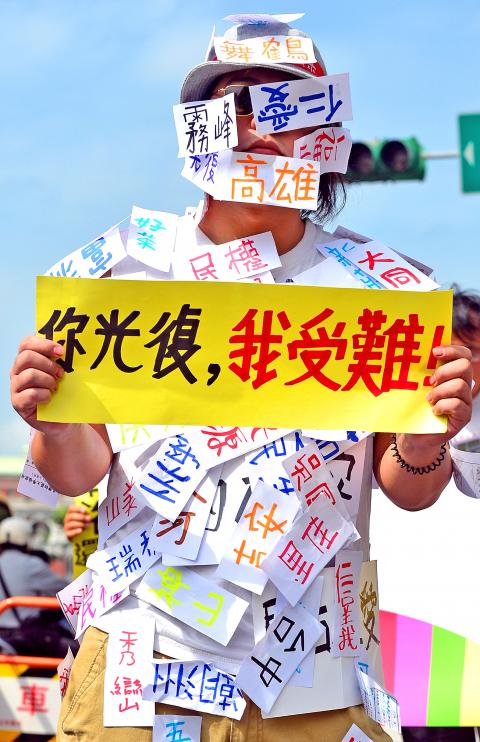Aboriginal rights activists yesterday rallied on Ketagalan Boulevard in Taipei, calling for changes to place names in Aboriginal regions across the country from the current government-imposed names that hold political connotations.
Dozens of activists yesterday rallied on the road in front of the Presidential Office Building, protesting the government’s naming of places such as Guangfu Township (光復) in Hualien County and Fusing Township (復興) in Taoyuan County.
The term guangfu literally means “restoration of Taiwan,” referring to the Chinese Nationalist Party (KMT) regime’s takeover of the country after the Japanese surrendered in 1945, while the term fusing means “revival of the nation,” referring to the KMT regime’s goal to reclaim the mainland.

Photo: Wang Yi-sung, Taipei Times
In addition, Renai (仁愛) and Sinyi (信義) townships in Nantou County mean “benevolence” and “fidelity and honesty” respectively, while Heping District (和平) in Taichung means “peace.”
“There are 55 Aboriginal townships around the country, but during 30 years of the Aboriginal rights movement, only the former Wufeng Township (吳鳳) in Chiayi County and the former Sanmin Township (三民) in former Kaohsiung County have been successfully renamed — Alishan and Namasiya — so far,” said Yapasuyongu Akuyana, a Tsou Aborigine representing the Indigenous Peoples’ Action Coalition of Taiwan, addressing demonstrators and the media. “As more and more tribal elders who still clearly remember the original Aboriginal place names are leaving us, those names will eventually be forgotten if we don’t stand up to demand the change now.”
“Wufeng” is the name of a historic figure who is said to have sacrificed his own life to “correct” the headhunt custom of Tsou Aborigines, while “sanmin” refers to the Three Principles of the People coined by Republic of China founder Sun Yat-sen (孫逸仙).
Lin Shih-wei (林世偉), an Atayal artist from Jianshi Township (尖石), Hsinchu County, burst into tears while saying that the government has not only taken their lands, but also changed the names, forcing them into exile on their own lands.
“I am especially heartbroken that, despite our invitations, none of the Aboriginal lawmakers showed up in the rally,” he said.
Earlier in the week, a group of young Amis Aborigines from Tafalong and Fata’an villages in Guangfu protested the township’s name by painting the two villages’ names and the question “whose restoration is it?” on the walls of the Guangfu Township Office.

Three Taiwanese airlines have prohibited passengers from packing Bluetooth earbuds and their charger cases in checked luggage. EVA Air and Uni Air said that Bluetooth earbuds and charger cases are categorized as portable electronic devices, which should be switched off if they are placed in checked luggage based on international aviation safety regulations. They must not be in standby or sleep mode. However, as charging would continue when earbuds are placed in the charger cases, which would contravene international aviation regulations, their cases must be carried as hand luggage, they said. Tigerair Taiwan said that earbud charger cases are equipped

Foreign travelers entering Taiwan on a short layover via Taiwan Taoyuan International Airport are receiving NT$600 gift vouchers from yesterday, the Tourism Administration said, adding that it hopes the incentive would boost tourism consumption at the airport. The program, which allows travelers holding non-Taiwan passports who enter the country during a layover of up to 24 hours to claim a voucher, aims to promote attractions at the airport, the agency said in a statement on Friday. To participate, travelers must sign up on the campaign Web site, the agency said. They can then present their passport and boarding pass for their connecting international

WEATHER Typhoon forming: CWA A tropical depression is expected to form into a typhoon as early as today, the Central Weather Administration (CWA) said yesterday, adding that the storm’s path remains uncertain. Before the weekend, it would move toward the Philippines, the agency said. Some time around Monday next week, it might reach a turning point, either veering north toward waters east of Taiwan or continuing westward across the Philippines, the CWA said. Meanwhile, the eye of Typhoon Kalmaegi was 1,310km south-southeast of Oluanpi (鵝鑾鼻), Taiwan’s southernmost point, as of 2am yesterday, it said. The storm is forecast to move through central

Taiwan sweltered through its hottest October on record, the Central Weather Administration (CWA) said yesterday, the latest in a string of global temperature records. The main island endured its highest average temperature since 1950, CWA forecaster Liu Pei-teng said. Temperatures the world over have soared in recent years as human-induced climate change contributes to ever more erratic weather patterns. Taiwan’s average temperature was 27.381°C as of Thursday, Liu said. Liu said the average could slip 0.1°C by the end of yesterday, but it would still be higher than the previous record of 27.009°C in 2016. "The temperature only started lowering around Oct. 18 or 19